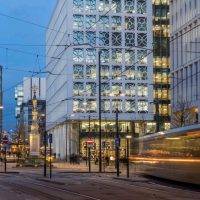To provide the best experiences, we use technologies like cookies to store and/or access device information. Consenting to these technologies will allow us to process data such as browsing behaviour or unique IDs on this site. Not consenting or withdrawing consent, may adversely affect certain features and functions.
The technical storage or access is strictly necessary for the legitimate purpose of enabling the use of a specific service explicitly requested by the subscriber or user, or for the sole purpose of carrying out the transmission of a communication over an electronic communications network.
The technical storage or access is necessary for the legitimate purpose of storing preferences that are not requested by the subscriber or user.
The technical storage or access that is used exclusively for statistical purposes.
The technical storage or access that is used exclusively for anonymous statistical purposes. Without a subpoena, voluntary compliance on the part of your Internet Service Provider, or additional records from a third party, information stored or retrieved for this purpose alone cannot usually be used to identify you.
The technical storage or access is required to create user profiles to send advertising, or to track the user on a website or across several websites for similar marketing purposes.
 New World Health Organization (WHO) Global Air Quality Guidelines (AQGs) claim to provide clear evidence of the damage air pollution inflicts on human health, at even lower concentrations than previously understood. The guidelines recommend new air quality levels to protect the health of populations, by reducing levels of key air pollutants, some of which also contribute to climate change. More →
New World Health Organization (WHO) Global Air Quality Guidelines (AQGs) claim to provide clear evidence of the damage air pollution inflicts on human health, at even lower concentrations than previously understood. The guidelines recommend new air quality levels to protect the health of populations, by reducing levels of key air pollutants, some of which also contribute to climate change. More →





 Since offices reopened, there has naturally been a much greater focus on health and safety. Office managers everywhere have deployed one-way corridors, anti-viral disinfectant wipes, and daily temperature checks in order to ensure that those who have returned to the office feel safe. Globally, businesses have learned to cope with these adverse circumstances, but there are other lessons from the past year that we should use to refresh the workplace as well.
Since offices reopened, there has naturally been a much greater focus on health and safety. Office managers everywhere have deployed one-way corridors, anti-viral disinfectant wipes, and daily temperature checks in order to ensure that those who have returned to the office feel safe. Globally, businesses have learned to cope with these adverse circumstances, but there are other lessons from the past year that we should use to refresh the workplace as well. 
 Research from
Research from 
 Hybrid working could bring nearly four million people “locked out” from work such as parents, carers and disabled people into the workforce and enable part-time workers to work more hours adding £48.3bn to the UK economy each year, according to a new study by
Hybrid working could bring nearly four million people “locked out” from work such as parents, carers and disabled people into the workforce and enable part-time workers to work more hours adding £48.3bn to the UK economy each year, according to a new study by 


 New ways of working will boost UK productivity and increase employment levels in cities outside of London, according to a new report from KPMG. And as businesses in some sectors prepare for employees to spend two to three days a week working from home on a permanent basis, demand for office space could see capacity potentially increase by as much as 40 percent, according to a new KPMG report,
New ways of working will boost UK productivity and increase employment levels in cities outside of London, according to a new report from KPMG. And as businesses in some sectors prepare for employees to spend two to three days a week working from home on a permanent basis, demand for office space could see capacity potentially increase by as much as 40 percent, according to a new KPMG report, 
 New research from
New research from 
 Disruption, cost, building style, individual goals, responsibility and shared space are cited as the key sustainability challenges for the flexible office sector, according to the
Disruption, cost, building style, individual goals, responsibility and shared space are cited as the key sustainability challenges for the flexible office sector, according to the 
 The
The 
 Social enterprises tackle large-scale social problems by attracting resources and legitimacy from businesses – but social enterprises and businesses have two often contradictory aims; market success and social impact.
Social enterprises tackle large-scale social problems by attracting resources and legitimacy from businesses – but social enterprises and businesses have two often contradictory aims; market success and social impact. 
 I’m a Luddite. This is not a hesitant confession, but a proud proclamation. I’m also a social scientist who studies how new technologies affect politics, economics and society. For me, Luddism is not a naïve feeling, but a considered position. And once you know what Luddism actually stands for, I’m willing to bet you will be one too — or at least much more sympathetic to the Luddite cause than you think.
I’m a Luddite. This is not a hesitant confession, but a proud proclamation. I’m also a social scientist who studies how new technologies affect politics, economics and society. For me, Luddism is not a naïve feeling, but a considered position. And once you know what Luddism actually stands for, I’m willing to bet you will be one too — or at least much more sympathetic to the Luddite cause than you think. 









September 28, 2021
Developing a future of work strategy depends on asking the right questions
by Mark Caskey • Comment, Flexible working, Workplace design